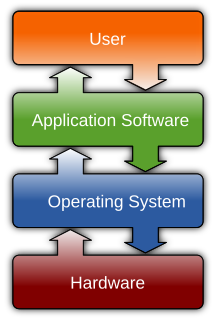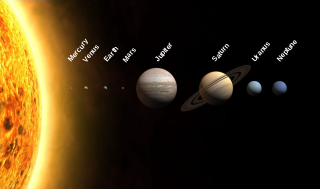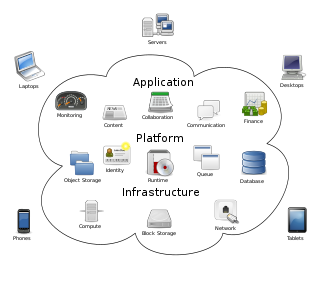
Software is a collection of instructions that tell a computer how to work. This is in contrast to hardware, from which the system is built and actually performs the work.

C is a general-purpose, procedural computer programming language supporting structured programming, lexical variable scope, and recursion, with a static type system. By design, C provides constructs that map efficiently to typical machine instructions. It has found lasting use in applications previously coded in assembly language. Such applications include operating systems and various application software for computer architectures that range from supercomputers to PLCs and embedded systems.
Microsoft Windows, commonly referred to as Windows, is a group of several proprietary graphical operating system families, all of which are developed and marketed by Microsoft. Each family caters to a certain sector of the computing industry. Active Microsoft Windows families include Windows NT and Windows IoT; these may encompass subfamilies,. Defunct Microsoft Windows families include Windows 9x, Windows Mobile and Windows Phone.

macOS is a proprietary graphical operating system developed and marketed by Apple Inc. since 2001. It is the primary operating system for Apple's Mac computers. Within the market of desktop and laptop computers it is the second most widely used desktop OS, after Windows NT and ahead of Chrome OS.

An operating system (OS) is system software that manages computer hardware, software resources, and provides common services for computer programs.

The International System of Units, known by the international abbreviation SI in all languages and sometimes pleonastically as the SI system, is the modern form of the metric system:41 and the world's most widely used system of measurement.:252 Established and maintained by the General Conference on Weights and Measures (CGPM), it is the only system of measurement with an official status in nearly every country in the world, employed in science, technology, industry, and everyday commerce. The SI comprises a coherent system of units of measurement starting with seven base units, which are the second, metre, kilogram, ampere, kelvin, mole, and candela. The system can accommodate coherent units for an unlimited number of additional quantities. These are called coherent derived units, which can always be represented as products of powers of the base units. Twenty-two coherent derived units have been provided with special names and symbols. The seven base units and the 22 coherent derived units with special names and symbols may be used in combination to express other coherent derived units. Since the sizes of coherent units will be convenient for only some applications and not for others, the SI provides twenty prefixes which, when added to the name and symbol of a coherent unit produce twenty additional (non-coherent) SI units for the same quantity; these non-coherent units are always decimal multiples and sub-multiples of the coherent unit. The SI is intended to be an evolving system; units and prefixes are created and unit definitions are modified through international agreement as the technology of measurement progresses and the precision of measurements improves.

The Solar System is the gravitationally bound system of the Sun and the objects that orbit it, either directly or indirectly. Of the objects that orbit the Sun directly, the largest are the eight planets, with the remainder being smaller objects, the dwarf planets and small Solar System bodies. Of the objects that orbit the Sun indirectly—the natural satellites—two are larger than the smallest planet, Mercury.

A wiki is a hypertext publication collaboratively edited and managed by its own audience directly using a web browser. A typical wiki contains multiple pages for the subjects or scope of the project and could be either open to the public or limited to use within an organization for maintaining its internal knowledge base.

A geographic coordinate system (GCS) is a coordinate system associated with positions on Earth. A GCS can give positions:

The circulatory system, also called the cardiovascular system or the vascular system, is an organ system that permits blood to circulate and transport nutrients, oxygen, carbon dioxide, hormones, and blood cells to and from the cells in the body to provide nourishment and help in fighting diseases, stabilize temperature and pH, and maintain homeostasis.

Video on demand (VOD) is a media distribution system that allows users to access videos without a traditional video playback device and the constraints of a typical static broadcasting schedule. In the 20th century, broadcasting in the form of over-the-air programming was the most common form of media distribution. As Internet and IPTV technologies continued to develop in the 1990s, consumers began to gravitate towards non-traditional modes of content consumption, which culminated in the arrival of VOD on televisions and personal computers.

The Most Excellent Order of the British Empire is a British order of chivalry, rewarding contributions to the arts and sciences, work with charitable and welfare organisations, and public service outside the civil service. It was established on 4 June 1917 by King George V and comprises five classes across both civil and military divisions, with the most senior two classes making the recipient either a knight if male or dame if female. There is also the related British Empire Medal, whose recipients are affiliated with, but not members of the order.
A multiplayer video game is a video game in which more than one person can play in the same game environment at the same time, either locally or online over the Internet. Multiplayer games usually require players to share a single game system or use networking technology to play together over a greater distance; players may compete against one or more human contestants, work cooperatively with a human partner to achieve a common goal, or supervise other players' activity. Due to multiplayer games allowing players to interact with other individuals, they provide an element of social communication absent from single-player games.

A digital object identifier (DOI) is a persistent identifier or handle used to identify objects uniquely, standardized by the International Organization for Standardization (ISO). An implementation of the Handle System, DOIs are in wide use mainly to identify academic, professional, and government information, such as journal articles, research reports, data sets, and official publications. However, they also have been used to identify other types of information resources, such as commercial videos.

Linux is a family of open-source Unix-like operating systems based on the Linux kernel, an operating system kernel first released on September 17, 1991, by Linus Torvalds. Linux is typically packaged in a Linux distribution.

A computer is a machine that can be programmed to carry out sequences of arithmetic or logical operations automatically. Modern computers can perform generic sets of operations known as programs. These programs enable computers to perform a wide range of tasks. A computer system is a "complete" computer that includes the hardware, operating system, and peripheral equipment needed and used for "full" operation. This term may also refer to a group of computers that are linked and function together, such as a computer network or computer cluster.

Android is a mobile operating system based on a modified version of the Linux kernel and other open source software, designed primarily for touchscreen mobile devices such as smartphones and tablets. Android is developed by a consortium of developers known as the Open Handset Alliance and commercially sponsored by Google. It was unveiled in November 2007, with the first commercial Android device, the HTC Dream, being launched in September 2008.
High-definition television describes a television system providing a substantially higher image resolution than the previous generation of technologies. The term has been used since 1936, but in modern times refers to the generation following standard-definition television (SDTV), often abbreviated to HDTV or HD-TV. It is the current de facto standard video format used in most broadcasts: terrestrial broadcast television, cable television, satellite television and Blu-ray Discs.

Cloud computing is the on-demand availability of computer system resources, especially data storage and computing power, without direct active management by the user. Large clouds often have functions distributed over multiple locations, each location being a data center. Cloud computing relies on sharing of resources to achieve coherence and economies of scale, typically using a "pay-as-you-go" model which can help in reducing capital expenses but may also lead to unexpected operating expenses for unaware users.

Unix is a family of multitasking, multiuser computer operating systems that derive from the original AT&T Unix, whose development started in the 1970s at the Bell Labs research center by Ken Thompson, Dennis Ritchie, and others.
















